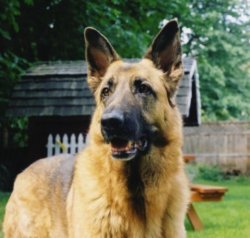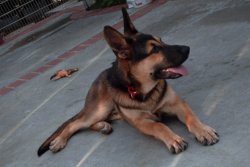The German Shepherd is a Highly Intelligent Breed
German Shepherd
Intelligent to the point of being considered "highbrow" by fellow canines, the German Shepherd, belonging to the herding group, is a fairly new breed to the United States. Originally trained to guard and control herds of sheep, this breed now represents nearly 5% of dogs registered with the American Kennel Club.
Endearingly loyal and fiercely protective of their owners, this dog became quite popular following World War One, gaining celebrity status in silent films as the ever-courageous Rin Tin Tin. The breed's popularity suffered a decline during World War Two due to anti-German sentiment, but quickly rebounded several years later because of its naturally captivating traits.
Intelligence
As the second most popular dog breed in the United States, the German Shepherd is also the third most intelligent, with Border Collies being first and poodles being second. Owners have discovered that most German Shepherds will learn simple tasks after only four or five attempts of the trainer showing the dog what needs to be done. This capacity for quick learning, complemented by their agility, strength and loyalty, have made them a favorite as guard, police, search and rescue, and even assistance dogs.

Temperament
The German Shepherd is perhaps the most loyal and eager to please of all the other breeds. These dogs instinctively need a purpose and one of those purposes is to bond for life with its owner. They love to learn new things and can become over-protective of their humans and territory to the point of being aggressive. Aloof yet obedient, shepherds do not readily accept strangers as being "long-lost friends" like Labradors and Collies do. However, correct socialization early in life can help the dog become more receptive of other people venturing into its personal space.
Daily walks and vigorous exercise sessions satisfy the dog’s desire for activity and companionship. Since these dogs still retain that herding instinct, a short walk around the block will not appease his need for a compulsion to roam and pace. If you place this dog in a large, fenced yard, you will immediately notice his urge to purposefully walk all around the yard with an authoritative gait, appearing as though he were indeed "herding" sheep. As with most dogs that do not receive sufficient amounts of free play and exercise, this breed exhibits destructive and combative behavior when confined in a restricted space.
Appearance and Grooming
Nearly everyone immediately recognizes the German Shepherd by his distinctive gray and black, or tan and black colors. The coat is also a "double coat", which means the dog has an outer coat he sheds during any season, and a thicker undercoat which never sheds. Medium length fur is the norm for this breed, while those with long hair have expressed a recessive gene and are thus harder to find.
These dogs have erect, pointed ears, longish snouts, vigilant eyes and an ever-present alert expression, which makes them appear as though they don't want to miss anything happening around them. Strong-looking and agile, these dogs present the epitome of a healthy, capable and handsome dog.
Unless you brush this breed every day, loose hair will be your constant companion. Only bathe him if he becomes dirty as excessive bathing may causing itching and dry skin due to forced removal of necessary skin oils.

Health
These are healthy dogs, weighing 75 to 95 pounds, and usually only suffering health problems due to inbreeding. Hip and elbow dysplasia commonly affects an inbred dog, which may cause the dog to suffer pain and arthritis in later years when the abnormally formed hip or elbow socket calcifies and is unable to rotate properly.
Ear infections can often affect this breed because of his large, open ears. Caused by bacteria, otitis externa and otitis media can frequently bother these dogs and cause them to tilt their heads from one side to the other, or shake their heads more than usual. A trip to the veterinarian who prescribes antibiotics for these conditions usually cures these issues.
Smart, loyal, and protective, a German Shepherd is a good family dog and working dog. A larger breed that needs room to play, this dog will become part of the family in no time.

Return from German Shepherd to Dog-Breeds-Explorer Homepage
Large Dog Breeds
• Boxer
